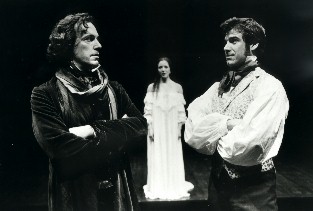


from performance review picture
Electronic Text (E-text online)
http://www.field-of-themes.com/shakespeare/comtext/comedy/allswell.htm
http://www.classicreader.com/shakespeare/Alls-Well-That-Ends-Well/
http://darkwing.uoregon.edu/~rbear/shake/awtw.html
http://tech-two.mit.edu/Shakespeare/Comedy/allswellthatendswell/allswellthatendswell.html
Summary of play
http://daphne.palomar.edu/shakespeare/lambtales/LTALSWEL.HTM
On-line Essay
http://www.orat.ilstu.edu/shakespeare/research/allswell.html
Study Questions for Shakespeare's All's Well That Ends Wellquoted from http://www.jetlink.net/~massij/wssq/allswell.htm
As the play often notes, Helen shares a name with a notorious woman--Helen of Troy. This historical namesake has an ambiguous reputation in Shakespeare's day: on the one hand, she is a famous beauty who is kidnapped for this by the gods and made a reward for Paris, prince of Troy--note the Clown's song at 1,3. So at one level, she is a woman who, because of her natural attributes, is made a victim of fate or the gods. Any man of normal desires wants her. On the other hand, the wife of Menelaus adapts to being the property of Paris--and don't overlook where parts of this play are set, incidentally--and thus is suspect with regard to her virtue. How does Helen compare with her famous predecessor? Don't forget that she is in inappropriate match, due to her social class, for a Count. Can anyone else in the play be compared to Queen Helen? Note that Shakespeare will return to this issue in Troilus and Cressida. Note the flood of fairy-tale motifs in this play--the King's blind promise to grant Helen's unknown wish if only she will solve his problem, the miracle cure, the riddle and the impossible quest. What do these lend to the story? How do they affect your perceptions of the characters? How would you perceive these characters if there were no miracles? How would the nobility of Shakespeare's day feel about marrying Helen? For a good clue, see Helen's response when asked by the Countess if she loves Bertram. Note also the comparison between her and Medea suggested by her use of a potion to restore an aged man in the place of a father to her beloved. How does her fate compare to that of Medea? What are the conditions of her deal with the King? Compare Parolles and Lafew. How are they alike and why are they initially drawn to each other in the world of the court? Why does Lafew get angry with Parolles in Act 2? This is a crucial moment in the play; note how the distinction which Parolles would hide between servant and master drives this world. Who else relies on the privileges of rank in this story? How and when? What is the threat when rank is disrupted? What then does Helen represent in this world? Why are so many people of higher rank still on her side? What is the ultimate fate of Parolles? Why? How does the drum incident compare to Bertram's actions? To Helen's? Note how Helen's request for help is set in a scene parallel to the same sort of request from Parolles after his disgrace. Why? Bertram is certainly easy to vilify by the standards of our day. But consider that the same rules that he wants to employ in his standards of marital partners and which the King breaks are the very rules that preserve the power of the nobility. Can this excuse Bertram's resentment of Helen? What is Bertram like? What are his goals? What kind of a judge of people is he? In Act Five, he finally explains why he cannot love Helen. What is his excuse? Can we believe him? How do you know? By this point, Helen has repeated several times that "all's well that ends well." Is she correct? Has Bertram simply been misled by Parolles as some characters suggest? Often the plays of this era pit an older generation depicted as repressive against a younger generation that must redefine the rules and replace their elders in order to attain their reasonable and acceptable desires. How would you characterize the generations and their relationships within this play's world? Shakespeare often considers the fragility of a woman's sexual reputation within his plays. This play does that as well, but it also considers the fragility of a male character's reputation, as a nobleman, as a warrior, and as a husband against that of a virtuous woman (Helen). What makes or break the nobleman's reputation? Where is Bertram with regard to this issue by the end of the play? What are the results of his sexual attempts on Diana? How important is her response to him after he has slept with Helen in her place? What is the symbolism of the ring in this play? Note how many times rings get traded, and how each time they replace some other commodity--i.e. Diana gets a ring for her maidenhead (allegedly), the ring of Helen on Bertram's finger will equal an inescapable contract of marriage, etc. Trace all of these relationships and consider: if a ring equals all of these things, then they all must equal each other within this world. What sorts of commodities become equivalent to each other through the exchange of rings and what do these equivalencies mean?
theatre review
http://www.independent.co.uk/enjoyment/Theatre/Theatre/Reviews/2000-07/allswell240700.shtml
http://www.salsachicago.com/AlallswellendswellReview.htm
http://www.curtainup.com/b-allswl.html
movies links http://us.imdb.com/Title?All%27s+Well+That+Ends+Well+(1968)+(TV)
interesting link